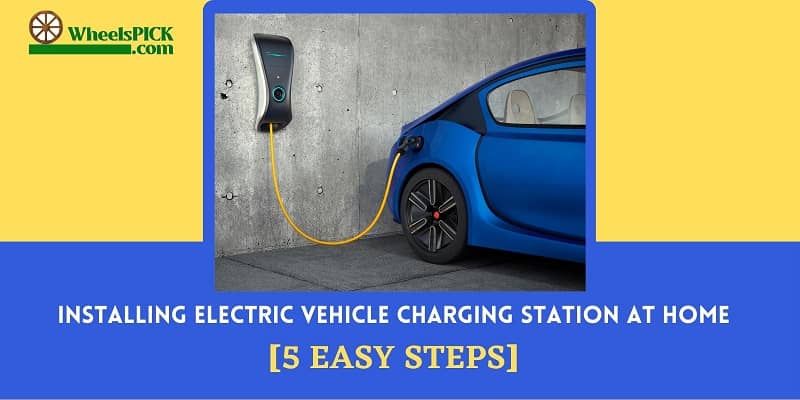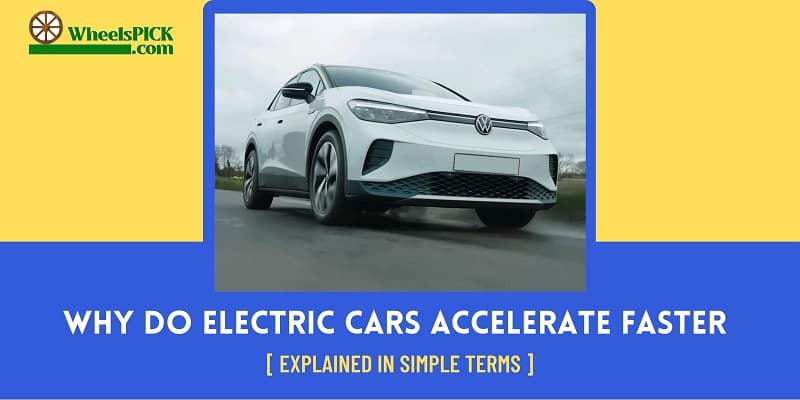If you are planning to buy a new car and looking into the industry, you should see the hype out there about EVs. Looking around, you’ll also notice EV car owners among your friends, family or neighbors are increasing day by day. I mean it’s cost efficient and eco friendly, so who doesn’t want a piece of that?
Just getting an electric vehicle might not be the end of the story here. With the EV, you also have to get a charging station and have to install it properly to get the most out of it. Now, as you are here, it’s easy to assume you are not one of those guys who clearly wants to know what they are getting into. Installing electric vehicle charging station at home all by yourself can be a great way of knowing how the EV charging system works and save the gas bill in the process.
In this guide I will show you the right way of installing the EV charging station at home including preparation and answer all the relevant questions regarding this matter. So, without wasting any time, let’s start.
How to Install an Electric Car Charging Station at Home?
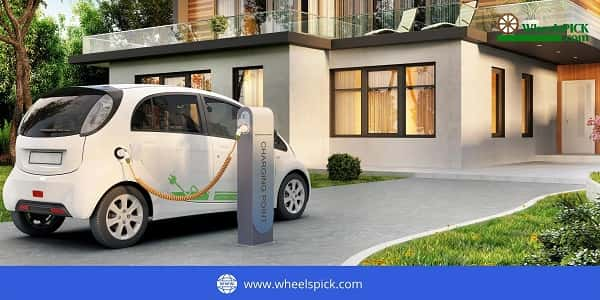
The installation of EV charging stations requires an electrician in the first place. Then the installer will come to your home, and verify the eligibility and compatibility of EV charging station installation at your home. Then according to your power infrastructure and installer’s suggestion, you’ll buy the charging point. Finally, the installer will come to your house and install the EV charging station at home.
5 Easy Steps to Installing Electric Vehicle Charging Station at Home [A Complete Installation Guide]
Let’s clear out one thing here first. Unless you are someone with considerable expertise in EV charging or a certified electrician, there is no way you can install the EV charging station at your home all by yourself. Hiring an expert electrician can be expensive, but for the sake of executing the installation properly and safety, it’s definitely worth it. If you are planning to install an EV charging station at home, here are the steps you should follow, including hiring an electrician.

Step#1: Selecting An Installer
As I said before, the first step of EV charging station installation is to get in touch with a certified electrician who has prior experience in this line of work. If you are confused about the installer, you can ask around a bit and see who has EV charging stations installed at home. Also, the brand you bought the EV from can give you guidance in the matter.
Make sure you are hiring the right installer, or else it can mess your thousand dollars of investment into the charging system and your home’s electric grid. There are some certified electricians who have special training in EV infrastructure. If it’s possible, hiring them should be the best idea.
Step#2: Have the Installer Visit Your Home
Once you have selected the installer, have him visit your home for eligibility and compatibility. There are various categories of EV home charger and before you buy one, you have to make sure the one you’ll buy with the existing electric infrastructure at your home. The electrician in this case will make sure of that for you.
Also the installer will take necessary measurements and let you know about the best spot where you can install the charging station. Lastly, he will suggest the technical details of the charging station which will be compatible with your electricity system.
Step#3: Buy the EV Charging Station
Now that the installer told you about the compatibility, you should have a general idea about which EV charging station will be the best suited for you. In the later part of this article, the buying criteria are discussed in detail to make the best purchase possible. For now, I’ll advise you to get a high quality one without considering the price, as it’s a one-time investment.
Step#4: Install the Charger by the Installer
After you buy the EV charging station, have the installer come to your home and install the EV charging station. The installation process should take approximately two to three hour depending on the station you chose and the electricity infrastructure to your home.
Step#5: Finishing Touch
After the installation is complete, you should be ready to go. After the installation, charge your EV for a few minutes to ensure everything is working perfectly. If you have any question in mind about the whole system, you can ask it to the installer. Also, if you are new with EV charging, use the help of the installer to familiarize with the charger control, its features and sync the station with the charging app if there is any.
Types of EV Charging Stations: What is a Level 1, 2, 3 EV Charging Station and Their Installation Cost?
In simpler terms, the levels in EV charging simply refers to the current input, and therefore the charging speed of a particular charger. Apart from the speed, there are some other qualities that make each of these levels of charging unique. Here is a short discussion about each level to better understand them.
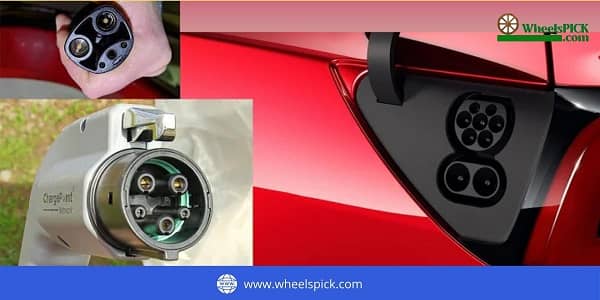
Level 1 EV Charging Station
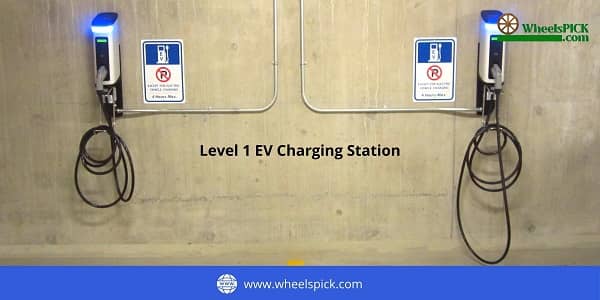
So, this is the most basic level of charging station out there as you can already assume by the name. This charger utilizes a fairly low voltage, and therefore generates lower current. As a result, the charging speed is way slower than level or a level 3 EV charging station.
Installing a level 1 EV charger doesn’t require any special plug connections or compatibility either. Some of them even work with the regular wall socket and three pin plug. As for the cost, the unit costs around $300.
Level 2 EV Charging Station
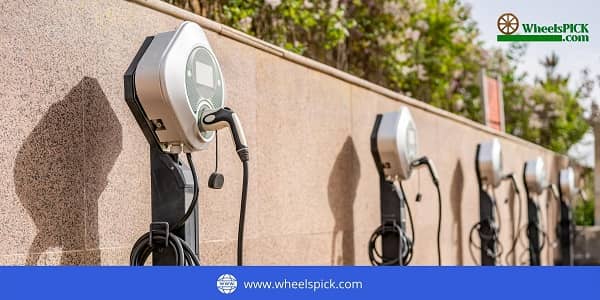
Next up, we have the level 2 of EV charging. Now this is the level where things actually start to get really fast. Due to the operation with much higher voltage, now the current generation is much higher. As a result, you get blazing fast charging from level 2 EV charging stations.
Level 2 EV chargers usually come with options to hardwire or plug in installation options, and the hardwiring involves hiring an electrician. But considering the charging speed you’ll get, the cost is worth it.
The cost is a bit higher as the unit itself can cost between $300 to $1000. Then comes the installation which will be between $200 to $800.
Level 3 EV Charging Station
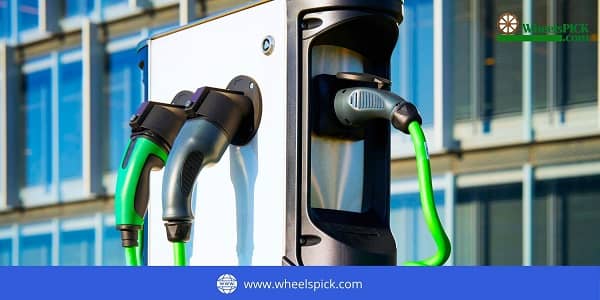
The last type we have is the level 3 EV charging. Now, level 3 EV charging is sort of irrelevant as they are only used for commercial purposes or roadside public charging places. As you can already assume, this is the fastest of all drawing massive amounts of power.
Level 3 charging stations are also the costliest one out there and installing that at home won’t be possible as most homes don’t have necessary power infrastructure to support it. A level 3 is only used for commercial and public stations, you have to keep in mind that the price will be higher. It can be anywhere between $14,000 to $1, 00,000 depending on the unit, location and relevant installation cost.
What to Consider When Buying and Installing a Home Electric Vehicle Charging Station?
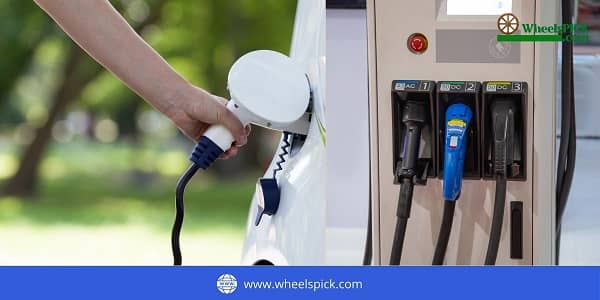
Previously I mentioned the purchase of the EV charging station is an important part of the whole process. Apart from the different aspects of the charger itself, here are some guidelines you should keep in mind.
Before you Begin of Electric Vehicle Charging Station
Before getting onto the technical details, there are some things you should keep in mind when finalizing an EV charging station.
- Decide the place where you want to keep your vehicle and measure its distance from the nearest electric port at home. Different chargers have different lengths of cable, that’s why this measurement is important.
- Buy the charging station according to the make and model of your EV. This way you’ll have an idea about the battery pack of your EV and how much power it’ll require.
- Have a clear idea about the distance you plan to cover regularly with your EV and what’s the maximum range of your EV.
Make Sure Your Home Is EV-Ready

Though the installer will come to your home to verify the compatibility of the EV charging station. However, you can do some study by yourself to make sure the EV charging station is going to work. If you are building a new house or renovating it, make sure to build necessary electric infrastructure to make your home EV-ready.
Giving Back
Once the installation is complete, you can also share your home EV charging stations with EV owners around the U.S. with PlugSahre.com. You will be able to see all the public charging stations as well as the plug-in owners who are willing to share their charger with others. They have an app for it too for both android and iOS users.
Itemized Installation Costs of EV Charging Station
Depending on various factors the installation cost of the EV charging station can be anywhere between $200 to $800. Here is a general breakdown of cost to give you a prior estimation.
EV Charging Station Material Cost
Assuming you are installing a level 2 EV charger, you’ll require a 240 volt system and its new circuits are about $10 to $40 on the market. Then comes the electric wiring protective conduits, which will cost you $120 to $200. Lastly, the outlet cost is pretty low, around $1 to $5.
Electrician Fee
This fee can vary from area to area and change upon the hours of work. When you appoint an installer, it should be included in the contract with the approximate completion time. Depending on area and expertise level, an electrician can charge anywhere between $40 to $120. Exclusive charging station experts also offer flat rates sometimes.
Miscellaneous
When the electrician, he should give you an estimation of the cost. However, apart from the calculated costs, there are some extras that you might have to spend. For example:
- Installing a new circuit to existing panel could cost you $150 to $200
- An old panel replacement could cost $2500
- Extra wirings will cost around $8 per linear foot
How Do Electric Vehicle Charging Stations Work?
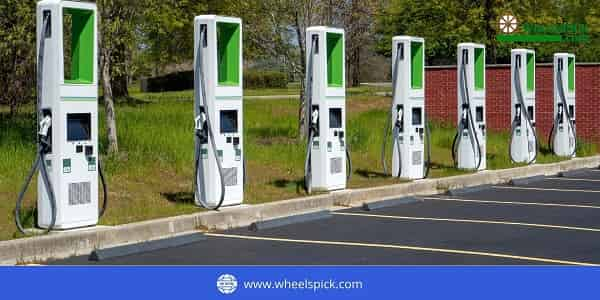
The working method of an EV charging station is pretty easy to understand. Assuming you are reading this article on your smartphone or laptop, all of these run on battery power. It’s the exact same for an EV, just the battery is much bigger in this case. Instead of gas, EV uses electric charge to run and that charge is received through the charging station by plugging in.
Cost of Installing Electric Car Charging Station: Home, Public and Commercial
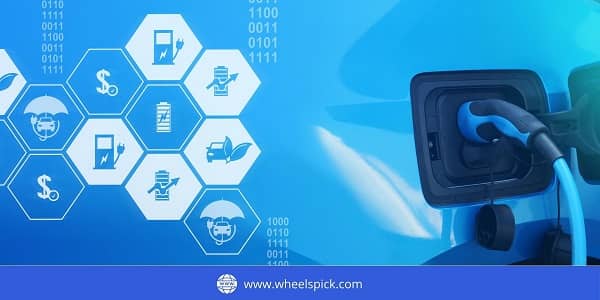
In case you are wondering, the cost of installing an EV charger station at different places will have different costs. For example, the cost of installing a home is much lower than a commercial or public one. Why? Because public and commercial EV charging stations need more powerful power connection as they usually have the fastest level 3 charger, which also costs the most. If we talk about features, I have already mentioned above the cost of an EV Charging station at home usually goes as much as $800.
On the other hand, it can cost around $10,000 to $40,000 for public and commercial charging stations. Then comes the installation cost, which again varies from location to location. For public and commercial EV charging stations, it can be anywhere between $4,000 to $50,000.
How Much Does an Electric Car Charging Station Cost?
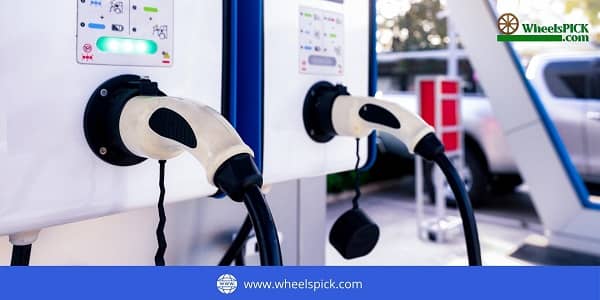
The cost of installing electric vehicle charging station at home depends on lots of factors. For example, there is performance, wireless connectivity, water resistance, safety certifications, ease of use, cable length etc. All these factors play a significant role in deciding the price of an EV charger. As we are talking about home EV charging stations, you have to choose between a level 1 and level 2 charger here.
A level 1 charger costs around $300 bucks for a replacement unit. When you purchase an EV, it usually comes with a level 1 charger. For level 2 chargers that costs go upwards significantly. Though it starts at around $300, a high quality premium level 2charger can cost up to $1000.
EV Charger Installation Requirements

Before you decide to install an EV charging station at home, you need to make sure that your home meets certain requirements for the installation. Whether you decide to hardwire it or use it as a plug-in, here are some requirements you have to meet.
- A nearby electric panel to connect the charger
- Ensuring the panel is powerful enough to run the charger
- Ensure the parking spot is within the reach of charging cable
- Ensure the station is within the reach of Wi-Fi network at home for wireless connectivity
Portability and EV Charger Cable Length
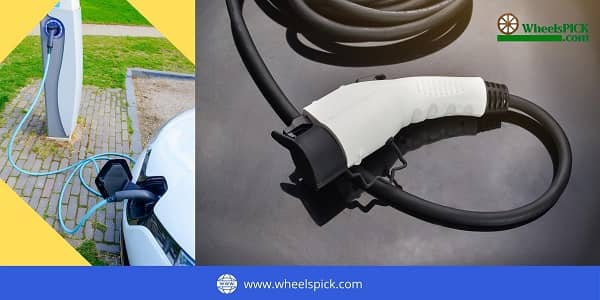
The best part about installing electric vehicle charging station at home is that you can use it both by hardwiring and using a plug-in method. If you have decided that you’ll use the charging station strictly at home, then you should definitely get it hardwired. But if you decide to carry it around you need to consider the portability and cable length too.
Level 2 EV chargers might not be that portable to carry around in a backpack, but you can definitely carry one around in your car. A compact charging station just makes it easy to handle and carry around. Then the cable length should be as long as possible as it allows you to charge the car far from the outlet. In this case, around 23 feet of cable should be standard.
Benefits of EV Charging at Home

At this point, if you are still having second thoughts about installing electric vehicle charging stations at home, there are tons of benefits than should make you lean towards it again. Here are some of the benefits you’ll get from installing a home EV charging station.
- Control Over Charging: Unless you buy the most basic home charging stations, these chargers are full of advanced features that’ll allow you to have control over different aspects of charging. Through app control, there are options like adjustable current scheduling the charge time, which makes the charging experience a whole lot easier.
- Sheer Convenience: This is one of the key benefits of having EV charging at home. Just imagine, normally you have to make stops at public charging spots to charge your EV. Even finding one of those can be a hassle in some areas. But now that you have an EV charging station, you can just plug it in at home and fit the charging time into your daily schedule.
- Cost Efficient: If you own an EV Yousef, you might have already noticed that the cost of having one is way less than having a gas vehicle. Charging is cheap, but it can be even cheaper if you decide to charge your EV at home rather than a public charging spot. Additionally, you can schedule the charger according to the off-peak hour to get a cheaper charging cost.
- Increases Property Value: As I have mentioned earlier, the use and popularity of EVs are increasing every day. If you are feeling confused about spending hundreds of dollars, well, you shouldn’t at all here. Because, installing an EV charger at home will not go to waste as it’ll add lots of value to your property. The automotive industry is going towards electric, and if you plan to sell your house in the future, an EV charging station will add a lot of value.
- Safety: Lastly, safety is another benefit you’ll get out of home EV charging. I mean, public charging spots are, well, public. There is always a chance that your car can get stolen, damaged or even get vandalized. On top of that, when the weather is bad, you can keep yourself and your EV safe by charging it at home.
Frequently Asked Questions (FAQ’s)
Q1. How Fast of an EV Charger Do You Need?
A) Answer to this question completely depends on the individual's needs. Ask yourself how much you need to drive every day. If you can afford the time of slow charging with a level 1 charger, then it’s fine. But if the agonizingly slow level 1 charging is bothering you and your daily schedule, you should invest in a level 2 charger. It can add around 10 - 20 miles an hour on average.
Q2. Should You Oversize Your Charging Station?
A) This question arises when you find a charger which has the features you want, the rated power is exceeding your circuit's capacity. In that case, if the power exceeds 80% of the circuit capacity, the charging station must have the ability to adjust and lower the current.
Many people suggest oversizing with current adjustability as it tends to offer more durability. Fr example, if you are using a 40 amps charging station only at 15 amps, it’s more likely to last longer.
Q3. Can I Charge a Tesla at Home? How Many Amps Do I Need for a Tesla Home Charger?
A) Yes, you can charge a Tesla at home. For home charging there is a 100 volt NEMA 5-15 charger included with every unit of Tesla. Though the speed is fairly slow, you can use it for home charging. As for the requirement, Tesla recommends a 240 volt NEMA 14-50 outlet for home charging. To get the most out of it, you’ll need a 50 amp circuit.
Q4. Can Any Electrician Install a Car Charger? Are There Any Government Grants for EV Charging Points?
A) Yes, as long as they have proper training and certification, any electrician is authorized to install a car charger. However, with the rise of EVs recently, there are advanced training available that specializes in EV charging. An electrician with that certification will be the best choice.
Right now, unfortunately there is no grant for EV charging points in the US. However, there are plans in motion to encourage users, similar to the UK’s EV home charge scheme. That scheme pays around 75% of the cost of the charging station and its installation.
Q5. How Do Electric Car Charging Stations Make Money?
A) Installing a home charging station can be a great way to charge your EV sitting at the comfort of home. However, one aspect here that many people don’t know about is profiting out of it. If your area has lots of EVs without sufficient points, you can rent yours and make some money out of it.
Q6. How Long Does It Take to Charge an Electric Car?
A) The answer depends on the battery pack in the EV and the charging capacity of the charging station. For example, a 100 kW battery will take around 5 hours to charge with an 11kWh charging point. The math is pretty simple here. For exact information about the battery pack or the charger’s capacity, you have to contact the manufacturer.
Q7. How Long Does It Take to Install an Electric Car Charging Station?
A) The installer you hired will answer this question as per the electric circuits and other requirements at your home. Not every house is the same, so the duration usually differs. Also, different types of EV charging points take different amounts of time. Typically, the installation period lasts about 2 to 4 hours. However, for exact duration, you need to contact the installer.
Q8. How Much Does It Cost to Charge an EV at Home?
A) Answer to this question depends on various factors. For starters, the battery size is different for different EVs. Then comes the charging time, whether you are charging your EV in peak or off-peak hours. As per the U.S. Energy Information Administration, average households in the US are charged around 14 cents per kWh. Now if you do the math using your car's battery pack and charging speed, that should give you the answer.
Final Verdict
The cost of gas is not only increasing every day, using gas also comes with additional cost too. In that regard, EVs have brought a big change in the automobile industry. Owning an EV means you don’t have to make regular stops at the gas station to fill up your tank. Instead, you can just installing electric vehicle charging station at home to get the charging done overnight before hitting the road next morning.
Now that you know all about installing electric vehicle charging station at home, you can charge your EV at home in a Jiffy. The whole installation process may seem a bit complex at first as there are different variables. But if you follow the instructions I mentioned in the guide, you can get the installation done pretty easily. Then, you’ll be able to enjoy the convenience of charging your EV at home.

